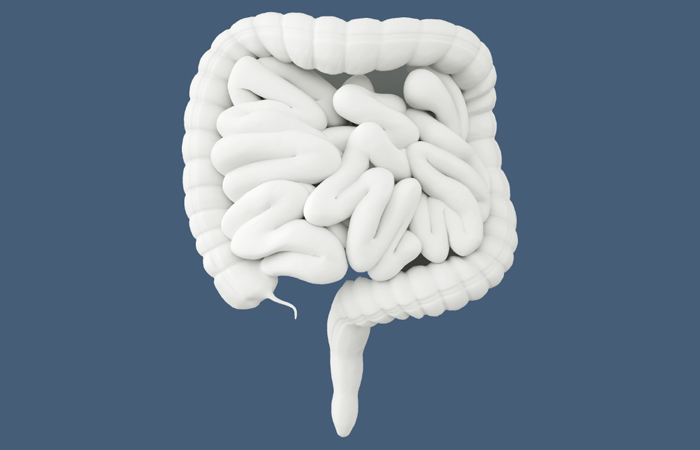A sensitive matter
In Conditions
Follow this topic
Bookmark
Record learning outcomes
Problems with digestion and the bowel are often ignored or overlooked, but early diagnosis can be crucial. Pharmacy teams can be on hand to help customers suffering from common bowel problems

Gut health tends to be taken for granted and many bowel problems are often ignored. In fact, a survey from last year’s digestive health campaign ‘Love Your Gut’ suggested that while more than half of the UK population have suffered from a chronic or persistent gut problem, a similar proportion believe that talking about bowel movements is taboo.
According to Bowel Cancer UK, one in 14 men and one in 19 women will be diagnosed with bowel cancer during their lifetime, but a lack of willingness to talk about bowels may delay them discussing potentially serious symptoms with a GP. However, the earlier bowel cancer is diagnosed, the easier it is to treat.
Every year in the UK, 2,400 people under the age of 50 are diagnosed with bowel cancer, yet most younger people are not even aware of the symptoms and report having to see their GP many times before being referred for crucial diagnostic tests.
According to the ‘Love Your Gut’ campaign, it’s crucial that people are more open about their bowel health, whatever their age. David McArthur, consultant colorectal surgeon at Spire Parkway Hospital in Solihull, says people should be aware of what is normal so that they can recognise any changes in their bowel health. “If you know what is normal, you can then act if something out of the ordinary happens,” he says. “A change in bowel habit that lasts for three weeks or more and blood in stools are warning signs that need acting upon as soon as possible.”
An essential role
The gut, which is also known as the digestive tract, processes food and extracts essential nutrients. It is also a vital part of the immune system, protecting the body from toxins and bacteria. Diarrhoea, constipation, abdominal pain and bloating are key signs that there’s something wrong. Poor gut health can cause various non-digestive symptoms, such as skin problems, migraines, water retention, low energy levels and poor immunity.
The gut can be affected by many factors, including stress, food, exercise, medicines and ageing, and there’s evidence that modern lifestyles are also a contributing factor. Professor Roger Jones, a bowel cancer expert from United European Gastroenterology, says: “The bowel is a complex organ that can trigger a number of different diseases and conditions, from inflammatory bowel disease, coeliac disease and irritable bowel syndrome to bowel cancer. For some conditions, lifestyle and dietary habits can help reduce the risk of developing the disease. A lack of exercise, smoking heavily and consuming a high quantity of red meat and alcohol can increase the risk of bowel cancer.”
A sensitive approach
Digestive health isn’t always an easy subject to bring up in conversation. While counter staff are often the first point of contact within the pharmacy, some customers may be too embarrassed to discuss their symptoms. However, if a customer asks to buy medicines such as laxatives, haemorrhoid creams or anti-diarrhoeals, this provides the ideal opportunity to broach the topic. Just remember that some customers may be more likely to talk to the pharmacist or in a more private area of the pharmacy, such as the consultation room.
When you are discussing digestive health with customers, it’s important to ask how long they have had their symptoms and how long they have been using over-the-counter medicines, as well as whether they have spoken to their GP. For acute symptoms (e.g. mild diarrhoea), suggest simple tips and self care measures, as well relevant medicines. Customers with severe, persistent or red flag symptoms – such as blood in their stools, a change in regular bowel habits, ongoing abdominal pain, unexplained weight loss, fatigue or a lump in their abdomen – should be referred to the pharmacist as they may need to see their GP.

Diarrhoea
Most people occasionally pass looser or more frequent stools and this is usually nothing to worry about. Acute diarrhoea tends to be caused by infection, allergy, excess alcohol, stress or newly prescribed medicines, and can take up to a week to clear up without any specific treatment. Anti-diarrhoeal medicines such as loperamide are not usually necessary, but these can be taken early on by adults to reduce bowel movements, especially if the diarrhoea occurs just before a special occasion.
To manage diarrhoea, it’s important to drink plenty of water-based drinks, such as mineral water, salty soups or fruit juices. There’s no need for people to stop eating, but light carbohydrate-rich foods such as rice or crackers are advisable. For those at risk of dehydration – such as older people, young children and babies – recommend oral rehydration therapy for prevention. Customers should be referred to the pharmacist if diarrhoea is persistent, severe or contains blood, as this could indicate a chronic condition such as inflammatory bowel disease or bowel cancer.
Constipation
Around one in every seven UK adults and up to one in every three children will have constipation at some point, although bowel movement frequency varies from person to person.
A new study by Probiotics International Limited found that 50 per cent of people in the UK do not experience a bowel movement daily and that constipation is generally regarded as fewer than three defecations per week, or being unable to completely empty the bowel. This can cause stools to be hard and lumpy or unusually large or small.
Acute constipation can be triggered by a low-fibre diet, a change in eating habits, ignoring the urge to pass stools, some medicines and dehydration. Simple diet and lifestyle changes are the first-line treatment, including eating more fibre, drinking more fluids and exercising more.
According to the British National Formulary, laxatives should generally be avoided in adults, unless they are prescribed by a GP in specific circumstances (e.g. when straining could make a condition like angina worse). If adults do decide to take a laxative as a short-term measure, they should speak to the pharmacist first. Bulk-forming laxatives should be tried initially to make the stools softer and easier to pass. Children should only take laxatives if they have been prescribed by a GP.
Haemorrhoids
Haemorrhoids (swollen blood vessels in or around the anus) are particularly common in older people and pregnant women. They may be caused by prolonged constipation due to a low fibre diet or inadequate fluid intake, as well as straining on the toilet. Symptoms include anal itching, a painful swelling or lump near the anus, tenderness or pain during bowel movements and bright red bleeding. If customers notice bleeding, even if they know they have haemorrhoids, they must speak to their GP.
Haemorrhoids can usually be treated with OTC creams, pessaries or ointments to reduce swelling and inflammation, and painkillers to relieve any pain. Managing underlying constipation and not sitting for
too long may help in the longer term.
Irritable bowel syndrome
Irritable bowel syndrome (IBS) affects around one in five people and usually develops first in their 20s or 30s. Twice as many women are affected as men. The exact cause is unknown, but it may be related to increased gut sensitivity. The symptoms flare up and down, with stress playing a key role.
“IBS is often difficult to diagnose,” says Professor Jones. “People should visit their GP if they believe they are suffering from IBS symptoms, which include the urgent need to go to the toilet and stomach pains. Based on the symptoms, a GP may be able to diagnose IBS, but blood tests may be needed to rule out other conditions such as inflammatory bowel disease.”
IBS is commonly managed with dietary and lifestyle changes. Some people find it helpful to cut out certain types of carbohydrates that aren’t broken down easily in the gut, such as FODMAPs (fermentable oligosaccharides, disaccharides, monosaccharides and polyols). These are found in some fruits and vegetables, animal milk, wheat products and beans.
“Changing the level of fibre in the diet and low FODMAP diets can be effective for some patients,” says Professor Jones. “It is also suggested that patients should eat their meals at a consistent time each day and avoid rushing them to help reduce their IBS symptoms. Antispasmodic drugs can be prescribed or bought over the counter and many people find them helpful. There’s probably also a place for the use of probiotics in some patients.”
Coeliac disease
One in 100 people in the UK have coeliac disease, but it’s estimated that only 24 per cent of those with the condition are diagnosed. The immune system reacts to gluten found in wheat, barley, rye and sometimes oats, causing the body to attack itself, damaging the lining of the small bowel.
Symptoms include frequent bouts of diarrhoea, stomach pain and cramping, mouth ulcers, fatigue, gas and bloating, nausea and vomiting. According to a recent YouGov survey for Coeliac UK, up to 50 per cent of patients who are diagnosed with coeliac disease are also found to
be anaemic.
“Any patients with unexplained gastrointestinal symptoms should be referred to their GP for testing, including patients who have been diagnosed with irritable bowel syndrome,” says Ruth Passmore, Coeliac UK’s health policy officer. “One in four people with coeliac disease have previously been treated for IBS. Coeliac UK has developed an online assessment at isitcoeliacdisease.org.uk to help patients identify whether their symptoms indicate they should be tested for coeliac disease.”
The only treatment for coeliac disease is a strict gluten-free diet for life. “If left undiagnosed and untreated, coeliac disease has been shown to have a profound effect on quality of life,” says Professor Jones. “It may lead to adverse pregnancy outcomes and has also been associated with a reduced life expectancy and a slightly increased risk of small bowel cancer.”

Inflammatory bowel disease
Crohn’s disease and ulcerative colitis are forms of inflammatory bowel disease (IBD). Together, they affect around one in every 250 people in the UK. Both are chronic conditions that can flare up and down and tend to run in families.
The causes are largely unknown, although it’s thought that affected people may react abnormally to usually harmless bacteria in the gut. Ulcerative colitis only affects the colon (large intestine), but Crohn’s disease can cause symptoms in any part of the digestive tract, from the mouth to the anus.
Common symptoms of IBD include pain, swelling or cramping, recurring or bloody diarrhoea, weight loss, fatigue and sometimes a fever. Mild symptoms may not need any specific treatment, but medication can ease more severe flare ups and stop the symptoms from returning. Many people with IBD are treated with corticosteroids to reduce inflammation and medicines that suppress their immune system. If medication fails to work, they may require surgery.
Bowel cancer
Bowel cancer is the UK’s second biggest cancer killer, with people aged 60 and over most at risk. “There are factors relating to lifestyle that are associated with an increased likelihood of bowel cancer development,” says Lee Dvorkin, consultant general and colorectal surgeon at BMI The Cavell Hospital in Greater London. “The risks include eating processed and red meat, animal fat and sugar, alcohol, as well as smoking and obesity. A reduced risk has been noted in those who exercise and eat more fibre and pulses, so these are steps people should take.”
Signs of bowel cancer include changes in bowel habits, blood in the stools, unexplained weight loss, feeling tired without reason, stomach pains or a lump in the stomach. Currently, people who are registered with a GP and are aged 60-74 (50-74 in Scotland) will receive an NHS bowel cancer screening test in the post every two years.
More information can be found at the Bowel Cancer UK website.
Top tips for a healthy bowel
According to the charity Core, keeping our insides in good working order means treating them well. Here are some tips to recommend to customers:
- Keep hydrated: for most people, drinking around two pints (1.1 litres) of liquid a day is sufficient to keep the bowels healthy
- Eat a balanced diet, including plenty of fibre: according to bowel cancer expert, Professor Roger Jones, foods such as fish, fruit, vegetables and nuts have been associated with a reduced risk of bowel cancer, and studies suggest that ingredients such as curcumin, green tea, and vitamins D and E may help reduce the risk of digestive diseases
- Follow good eating habits: eating infrequent, large meals is more likely to affect bowel function than consuming smaller meals more regularly
- Take regular exercise: this could be visiting a gym twice a week or going for a brisk walk each day
- Reduce stress: stress can lead to anxiety, which can trigger many digestive symptoms, including diarrhoea and pain. Try relaxation techniques and get plenty of sleep
- Quit smoking and cut down on alcohol
- Try pre- and probiotics: these can restore the natural balance of bacteria in the gut. There’s some evidence that the probiotics found in ‘live’ yoghurts and some supplements may prevent antibiotic-associated diarrhoea, wind and bloating in IBS as well as symptoms of lactose intolerance.
One in 14 men and one in 19 women will be diagnosed with bowel cancer during their lifetime
